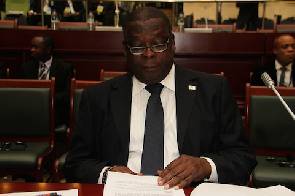 The government of Ghana has resolved to handover the management of the beleaguered Electricity Company of Ghana (ECG) to private hands, but the choice of privatisation has been the bottleneck, Starrfmonline.com can exclusively reveal.
The government of Ghana has resolved to handover the management of the beleaguered Electricity Company of Ghana (ECG) to private hands, but the choice of privatisation has been the bottleneck, Starrfmonline.com can exclusively reveal.
The John Mahama-led administration has been presented with two options should it decide to go ahead with the privatisation process to rescue the stated-owned company which is currently struggling to distribute power to Ghanaians.
According to a confidential report in Starrfmonline.com’s possession and titled: Ghana Power Compact Private Sector Participation Options Study for ECG: “The Government of Ghana has decided to focus their Private Sector Partner (PSP) choice [for ECG] on either a partial privatisation or a concession contract.”
The intercepted classified document which was prepared by the International Finance Corporation (IFC) was commissioned by the government of Ghana represented by the Ministry of Energy, the Millennium Development Corporation and the World Bank.
Starrfmonline.com understands the private partner for ECG “is expected to strengthen and improve corporate governance and management, invest in needed infrastructure to expand services, reduce loses, and improve quality of service delivery.”
The government of Ghana, according to starrfmonline.com’s highly placed sources in the corridors of power, is more likely to opt for partial privatisation since a concession contract can take two years or more to complete and “with election next year the government would not want to drag this beyond that.”
With partial privatization, “the government sells shares in ECG to a private partner and retain partial ownership of the company. While the government will still be a part owner of the company, the private partner will be responsible for operating and managing the company, as well as investing in upgrades critical to improving services,” the document stated.
However, with concession, “the Government will enter into an agreement with the private partner where the private partner will have the exclusive right to operate, maintain and carry out investment in ECG for a given number of years.
The Private Partner will have the responsibility over the operation and maintenance of all assets and investment during the period, but the government will remain the sole owner of ECG. Once the concession expires, the government will assume total control of the company. The number of years under this concession option is typically around 20 to 30 years.”
The document went on to explain further: “It is important to have a clear understanding of GoG’s principle on “Assets to remain in Government ownership or to have joint ownership through a PPP arrangement”.
Two issues stand out which have been discussed with the GoG team: ownership of assets and control over those assets (and control of ECG’s operations). Regarding the ownership of assets the issue is fairly straightforward: under a concession ECG, which is 100% owned by GoG, is the sole owner of all existing assets and the private partner is granted the exclusive right to operate those assets.
“Under partial privatisation, there is joint ownership between GoG and the private partner of ECG, with ECG owning all assets. The control of those assets, and the control over the use of those assets (and the operation of ECG), merits further review. Under either PSP option, GoG may want to have a voice in the operation of ECG, but this needs to be managed responsibly in a predictable and transparent manner…
“Under a concession, control of the assets is passed on to the private partner but ECG as conceding authority retains key monitoring powers as set out in the concession contract. GoG control is largely covered by statute through economic and technical regulation.
Under partial privatisation, GoG control can be exercised by other mechanisms other than ownership, these include a special class of shares, a golden share, and a shareholders’ agreement. The extent of GoG’s powers needs to be well understood and defined as it may have great impact on the success of the PSP option.”
The government of Ghana was given up to the end of December last year to make a decision on the option to be used for ECG, but sources say that “choice would be arrived at soon.”




